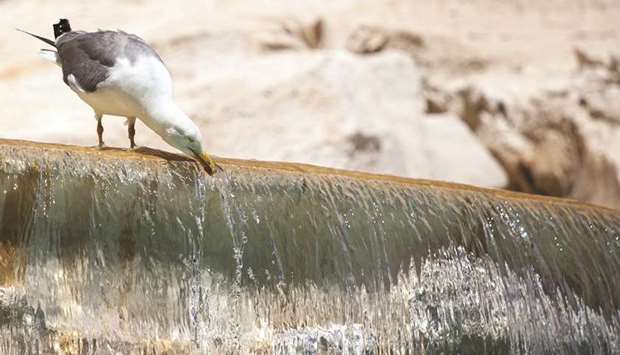Fans flew off store shelves and water fountains offered relief from the heat as temperatures soared in Europe yesterday, with officials urging vigilance ahead of even hotter conditions forecast later in the week.
Meteorologists blamed a blast of torrid air from the Sahara for the unusually early summer heatwave, which could send thermometers up to 40° Celsius (104° Fahrenheit) across large swathes of the continent with France experiencing particularly hot temperatures.
Authorities have issued warnings against dehydration and heatstroke, in particular for children and the elderly, and hospitals have been placed on high alert.
“I’m worried about people who are downplaying this, who are continuing to exercise as usual or stay out in the sun,” French Health Minister Agnes Buzyn said. “This affects all of us, nobody is a superman when it comes to dealing with the extreme heat we’re going to see on Thursday and Friday.”
In an unusual move, French Education Minister Jean-Michel Blanquer announced a delay to national school exams to protect pupils during the heatwave.
The Brevet national diploma exam – a key test for children aged around 14 that was set for Thursday and Friday – would be delayed until Monday and Tuesday next week, he said.
France still remembers the heatwave of August 2003 which was blamed for the deaths of 15,000 people and led to a surge of criticism over how authorities cared for those most vulnerable at the height of the summer holidays.
However, those extreme hot temperatures lasted for two weeks, whereas the worst of the heat is expected to be over by early next week.
“It’s unprecedented because it’s hitting so early in June, we haven’t seen this since 1947,” said Emmanuel Demael, a forecaster at the Meteo-France weather agency.
He expects records will be set for the month, “and in some places records for all months combined”.
In Paris, officials pledged to open “cool rooms” inside public buildings, set up temporary water fountains, and leave the city’s parks unlocked at night.
City workers also plan to distribute water to the homeless and install fans in schools and nurseries.
But electric fans were in short supply after weather reports prompted a rush on stores over the weekend, and France’s electric grid operator RTE is expecting a surge in demand as air-conditioning is turned up.
French retailer Boulanger said sales of “air treatment” equipment had jumped 400% from normal levels in recent days.
“I wanted to buy a fan but after selecting the model there were none left,” said Paris resident Anne Sophie Viger, 30, who works in insurance. “It is the night I am especially afraid of.”
Spain’s AEMET weather agency warned of an “extreme risk” of forest fires in areas including Aragon, Navarre and Extremadura, with temperatures that could exceed 42°C in the Ebro valley in the northeast.
In Germany, forecasters said the June record of 38.2°C for Frankfurt in 1947 was likely to come under threat, with little prospect of storms to cool things down.
“It could get up to 39°C, some places could even crack the 40°C mark,” said Sabine Krueger of the German weather service, with the southwest due to be the hottest.
Visitors in major tourist destinations like Rome and Barcelona used public fountains to cool their faces or dampen their hats for some refreshment.
Even Scandinavian countries are not being spared, with parts of southern Denmark and Sweden likely to reach 30°C starting today.
The temperatures will be most intense from Thursday, forecasters say, and high humidity is likely to make conditions even more difficult, especially at night.
Meteorologists have said such heatwaves are likely to be more frequent, even if countries succeed in their commitments to limit global temperature increases as part of the 2015 Paris climate accord.
“The hottest summers in Europe since the year 1500 AD all occurred since the last turn of the century: 2018, 2010, 2003, 2016, 2002,” said Stefan Rahmstorf, co-chair of Earth System Analysis at the Potsdam Institute for Climate Impact Research (PIK).
The Paris climate deal aims to contain increases to 1.5°C (2.6°F), committing nations to reduce emissions to this end.
The European Union has pledged to cut carbon emissions 40% below 1990 levels by 2030.

A seagull drinks water from the Trevi Fountain in Rome during an unusually early summer heatwave.
